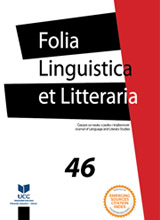AN ANALYSIS OF SOCIAL AND CULTURAL CAPITAL IN DON DELILLO'S WHITE NOISE: A BOURDEUSIAN PERSPECTIVE
AN ANALYSIS OF SOCIAL AND CULTURAL CAPITAL IN DON DELILLO'S WHITE NOISE: A BOURDEUSIAN PERSPECTIVE
Author(s): Erfan Bandad, Farah GhaderiSubject(s): Sociology of Culture, Theory of Literature, American Literature, Sociology of Literature
Published by: Filološki fakultet, Nikšić
Keywords: Don DeLillo; White Noise; Pierre Bourdieu; social capital; cultural capital;
Summary/Abstract: White Noise is Don DeLillo’s eighth novel which was published in 1985. The novel has been scrutinized by many scholars from different schools of thought. In this article, we try to read White Noise in light of Pierre Bourdieu’s concept of different types of capital and make an effort to take note of representations of each of these types. Nevertheless, since the biggest contribution Bourdieu makes to discussions regarding capital is his explanations of social capital and cultural capital, this article uses Bourdieu’s explanations of these categories of capital together with those of other Bourdeusian scholars in order to identify representations of social capital and cultural capital in the forms of the embodied state, the objectified state and the institutionalized state in the novel. In regards to social capital, the article argues that the efforts people make in White Noise to become members of various social groups are a strategy they devise in order to advance their overall capital. Furthermore, in terms of cultural capital, it is argued that its possession can help individuals gain benefits such as better chances of academic education and higher social ranks. Moreover, the findings suggest that access to the subcategories of cultural capital can elevate individuals’ social position.
Journal: Folia Linguistica et Litteraria
- Issue Year: 2023
- Issue No: 46
- Page Range: 265-279
- Page Count: 15
- Language: English

